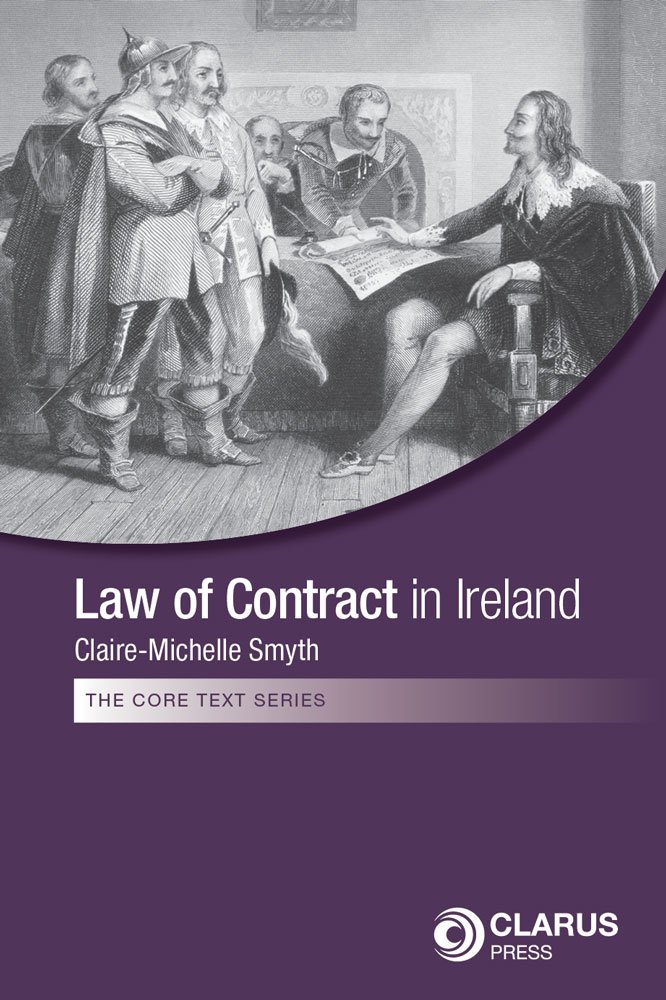About
Contract law serves as the cornerstone of commercial and personal interactions in Ireland, underpinning the relationships and transactions that define our society. Law of Contract in Ireland offers an in-depth exploration of this vital legal area, tailored specifically for students navigating the intricacies of Irish law.
This book delves into the fundamental principles of contract law, elucidating the key concepts and doctrines that govern contractual agreements in Ireland. It provides a clear and concise framework to understand the formation, interpretation, and enforcement of contracts, offering students a robust foundation for further study and professional practice.
Key Features Include
Historical Context: The book commences with an exploration of the historical development of contract law in Ireland, tracing its evolution from common law traditions and statutory enactments to contemporary jurisprudence.
Formation of Contracts: A detailed examination of the essential elements required for the formation of a legally binding contract is provided. This encompasses offer and acceptance, consideration, intention to create legal relations, and capacity of the parties.
Terms of the Contract: This book offers insights into the classification and interpretation of contractual terms, including express, implied, and collateral terms, as well as the role of representations and warranties in contractual agreements.
Vitiating Factors: Students are introduced to the vitiating factors that can invalidate or affect the enforceability of a contract, such as misrepresentation, mistake, duress, and undue influence.
Discharge and Remedies: Law of Contract in Ireland elucidates the various methods by which a contract may be discharged, including performance, agreement, frustration, and breach. It also examines the remedies available to parties in the event of a breach of contract, including damages, specific performance, and injunctions.
Contemporary Issues and Case Law: Law of Contract in Ireland incorporates recent developments and landmark decisions in Irish contract law, providing students with a contemporary perspective on the subject matter and enhancing their critical analysis skill.
To facilitate effective learning and comprehension Law of Contract in Ireland employs a range of pedagogical tools and features:
Case Studies: Real-world case studies and scenarios are integrated throughout the text to illustrate the application of legal principles in practice and encourage students to engage in critical thinking and problem-solving.
Chapter Summaries: Each chapter concludes with a concise summary of the key concepts and principles covered, enabling students to consolidate their understanding and reinforce their learning
Test your Knowledge Questions: Thought-provoking discussion questions and practical exercises are included to stimulate classroom discussions, foster analytical skills, and assess students’ comprehension of the material.
Content Includes
Chapter 1: Introduction, key concepts and overview
Part One: Contract Formation
Chapter 2: Agreement: Offer and Acceptance
Chapter 3: Consideration
Chapter 4: Intention to Create Legal Relations
Chapter 5: Capacity
Part Two: Contract Terms
Chapter 6: Certainty
Chapter 7: Terms
Chapter 8: Exclusion Clauses
Chapter 9: Unfair Terms and Consumer Contracts
Part Three: Defeating Contractual Liability
Chapter 10: Mistake
Chapter 11: Misrepresentation
Chapter 12: Duress
Chapter 13: Undue Influence
Chapter 14: Unconscionability
Chapter 15: Illegality and Public Policy
Part Four: Discharging the Contract
Chapter 16: Performance
Chapter 17: Frustration
Chapter 18: Breach
Part Five: Remedies
Chapter 19: Damages
Chapter 20: Equitable Remedies
Part Six: Limitations of Obligations
Chapter 21: Third Parties
Chapter 22: Assignment
About the Author
Dr Claire-Michelle Smyth is an Associate Professor of Law at Kingston University and author of Social and Economic Rights in Ireland (Clarus Press 2017).
Who Should Buy This Book?
Law of Contract in Ireland is an indispensable resource for law students and practitioners alike, offering a thorough and accessible introduction to the complexities of Irish contract law. By combining a rigorous academic approach with practical insights and contemporary relevance, this textbook equips students with the knowledge and skills necessary to navigate the multifaceted landscape of contract law with confidence and proficiency. Whether preparing for examinations or embarking on a career in law, readers will find this book to be an invaluable companion in their academic and professional journey.
